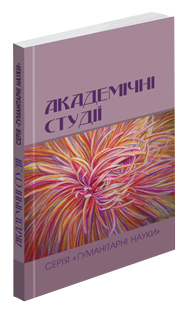Abstract
The article investigates the interrelation between the Ukrainian language and culture in the context of teaching Ukrainian as a foreign language. It emphasizes that effective language acquisition is impossible without immersion in the cultural environment, since language functions not only as a means of communication but also as a carrier of historical memory, traditions, mentality, and spiritual values of the nation. The role of the cultural component in shaping the intercultural competence of foreign students and in facilitating their successful adaptation to the academic and social environment in Ukraine is highlighted. Particular attention is given to cultural practices as a powerful tool for motivating and engaging students in active language learning. The educational process is considered as an integrated system that combines linguistic knowledge with cultural aspects, including traditions, holidays, customs, literature, art, and contemporary cultural processes. The study presents examples of integrating the cultural component into language training, such as the organization of festive events, language-and-culture projects, excursions, literary and artistic evenings, and the use of authentic texts, multimedia resources, and modern online platforms (e.g., Ukraїner, Prometheus, Ye-Mova). It is substantiated that such forms of work increase students’ interest in learning, reduce psychological barriers, promote the development of communicative skills, and foster a deeper understanding of Ukrainian culture. Methodological approaches ensuring the effective integration of language and culture are outlined, including cultural, communicative-cultural, project-based, multimedia, and intercultural approaches. The article concludes that incorporating the cultural component into the educational process not only enriches language training but also contributes to shaping a positive image of Ukraine as a country with a rich history and cultural heritage. This approach fosters the development of intercultural communication skills, enhances students’ motivation for learning, and ensures comprehensive acquisition of the Ukrainian language within an authentic sociocultural context.
References
Береза Л. Формування етнокультурної компетентності іноземних студентів у процесі навчання української мови. Українська мова і література в школі. 2022. № 3. С. 46–49.
Добірка онлайн-ресурсів для вдосконалення української мови. Режим доступу: https://osvitanova.com.ua/posts/4281?fbclid=IwAR0jCcv_NI4gQsEXYK2lzt17NmSkiox0d43saHuPq6LXQfxMj1F1m0wLVcg. Дата звернення: 14.07.2025.
Лещенко Т. О., Шевченко О. М., Юфименко В. Г. Інтеграція компонентів культури в процес навчання іноземних студентів української мови. Молодий вчений. 2019. № 5.1. С. 148–151.
Лещенко Т. О., Шевченко О. М., Козуб Г. М. Читаємо українською : посібник для іноземних студентів І–II курсів (соціокультурний аспект). І частина. Полтава : ФОП Гаража М.Ф., 2018. 129 с.
Пірен М. І. Українська мова – важливіший чинник єдності суспільства, формування української політичної нації та реалізації демократичних реформ. Вісник Національної академії державного управління при Президентові України. 2019. № 3. С. 85–90.
Чала К. Використання інформаційних систем та електронних видань у процесі вивчення іноземної мови у ВНЗ. Вища школа. 2019. № 4. С. 55–61.

This work is licensed under a Creative Commons Attribution 4.0 International License.

